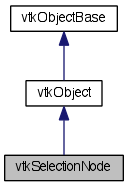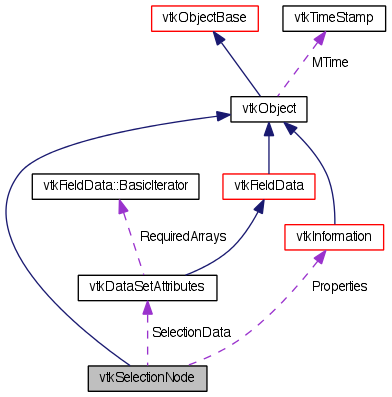A node in a selection tree. Used to store selection results. More...
#include <vtkSelectionNode.h>


Detailed Description
A node in a selection tree. Used to store selection results.
vtkSelectionNode stores selection parameters for a selection (or part of a selection). It stores a list of properties (in a vtkInformation) and a list of selection values (in a vtkAbstractArray). The properties provide information about what the selection values mean. For example the CONTENT_TYPE property gives information about what is stored by the node. If the CONTENT_TYPE is GLOBALIDS, the SelectionList array should contain a list of cell or point ids, which identify the particular cells or points that have matching values in the GLOBALID vtkDataSetAttribute array. If the CONTENT_TYPE is PEDIGREEIDS, the SelectionList array should contain a list of cell or point ids, which identify the particular cells or points that have matching values in the PEDIGREEID vtkDataSetAttribute array. The FIELD_TYPE property designates whether the selection refers to cells or points.
Usually, each node under the root is a selection from one data object. SOURCE or SOURCE_ID properties point to this object. If the selection was performed on a renderer, PROP or PROP_ID point to the prop the selection was made on. Selection nodes corresponding to composite datasets may contain child nodes. Each child node of a composite dataset should have COMPOSITE_INDEX set. This is the flat-index to identify a node with in the composite dataset to which the selection applies.
- Warning:
- No SelectionList is created by default. It should be assigned.
- Examples:
- vtkSelectionNode (Examples)
- Tests:
- vtkSelectionNode (Tests)
Definition at line 68 of file vtkSelectionNode.h.
Member Typedef Documentation
Reimplemented from vtkObject.
Definition at line 71 of file vtkSelectionNode.h.
Member Enumeration Documentation
Get the (primary) property that describes the content of a selection node's data. Other auxiliary description properties follow. GLOBALIDS means that the selection list contains values from the vtkDataSetAttribute array of the same name. PEDIGREEIDS means that the selection list contains values from the vtkDataSetAttribute array of the same name. VALUES means the the selection list contains values from an arbitrary attribute array (ignores any globalids attribute) INDICES means that the selection list contains indexes into the cell or point arrays. FRUSTUM means the set of points and cells inside a frustum LOCATIONS means the set of points and cells near a set of positions THRESHOLDS means the points and cells with values within a set of ranges GetContentType() returns -1 if the content type is not set.
- Enumerator:
SELECTIONS GLOBALIDS PEDIGREEIDS VALUES INDICES FRUSTUM LOCATIONS THRESHOLDS BLOCKS QUERY
Definition at line 123 of file vtkSelectionNode.h.
Controls whether cell, point, or field data determine what is inside and out. The default is CELL. Vertex and edge types are also available for graph classes. GetFieldType() returns -1 if the field type is not set.
Definition at line 153 of file vtkSelectionNode.h.
Constructor & Destructor Documentation
| vtkSelectionNode::vtkSelectionNode | ( | ) | [protected] |
| vtkSelectionNode::~vtkSelectionNode | ( | ) | [protected] |
Member Function Documentation
| static int vtkSelectionNode::IsTypeOf | ( | const char * | name | ) | [static] |
Return 1 if this class type is the same type of (or a subclass of) the named class. Returns 0 otherwise. This method works in combination with vtkTypeMacro found in vtkSetGet.h.
Reimplemented from vtkObject.
| virtual int vtkSelectionNode::IsA | ( | const char * | name | ) | [virtual] |
Return 1 if this class is the same type of (or a subclass of) the named class. Returns 0 otherwise. This method works in combination with vtkTypeMacro found in vtkSetGet.h.
Reimplemented from vtkObject.
| static vtkSelectionNode* vtkSelectionNode::SafeDownCast | ( | vtkObjectBase * | o | ) | [static] |
Reimplemented from vtkObject.
| virtual vtkObjectBase* vtkSelectionNode::NewInstanceInternal | ( | ) | const [protected, virtual] |
Reimplemented from vtkObject.
| vtkSelectionNode* vtkSelectionNode::NewInstance | ( | ) | const |
Reimplemented from vtkObject.
| void vtkSelectionNode::PrintSelf | ( | ostream & | os, |
| vtkIndent | indent | ||
| ) | [virtual] |
| static vtkSelectionNode* vtkSelectionNode::New | ( | ) | [static] |
Create an object with Debug turned off, modified time initialized to zero, and reference counting on.
Reimplemented from vtkObject.
| virtual void vtkSelectionNode::Initialize | ( | ) | [virtual] |
Restore data object to initial state,
| virtual void vtkSelectionNode::SetSelectionList | ( | vtkAbstractArray * | ) | [virtual] |
Sets the selection list.
| virtual vtkAbstractArray* vtkSelectionNode::GetSelectionList | ( | ) | [virtual] |
Sets the selection list.
| virtual void vtkSelectionNode::SetSelectionData | ( | vtkDataSetAttributes * | data | ) | [virtual] |
Sets the selection table.
| virtual vtkDataSetAttributes* vtkSelectionNode::GetSelectionData | ( | ) | [virtual] |
Sets the selection table.
| virtual vtkInformation* vtkSelectionNode::GetProperties | ( | ) | [virtual] |
Returns the property map.
| virtual void vtkSelectionNode::DeepCopy | ( | vtkSelectionNode * | src | ) | [virtual] |
Copy properties, selection list and children of the input.
| virtual void vtkSelectionNode::ShallowCopy | ( | vtkSelectionNode * | src | ) | [virtual] |
Copy properties, selection list and children of the input. This is a shallow copy: selection lists and pointers in the properties are passed by reference.
| unsigned long vtkSelectionNode::GetMTime | ( | ) | [virtual] |
Return the MTime taking into account changes to the properties
Reimplemented from vtkObject.
| static vtkInformationIntegerKey* vtkSelectionNode::CONTENT_TYPE | ( | ) | [static] |
Get the (primary) property that describes the content of a selection node's data. Other auxiliary description properties follow. GLOBALIDS means that the selection list contains values from the vtkDataSetAttribute array of the same name. PEDIGREEIDS means that the selection list contains values from the vtkDataSetAttribute array of the same name. VALUES means the the selection list contains values from an arbitrary attribute array (ignores any globalids attribute) INDICES means that the selection list contains indexes into the cell or point arrays. FRUSTUM means the set of points and cells inside a frustum LOCATIONS means the set of points and cells near a set of positions THRESHOLDS means the points and cells with values within a set of ranges GetContentType() returns -1 if the content type is not set.
| virtual void vtkSelectionNode::SetContentType | ( | int | type | ) | [virtual] |
Get or set the content type of the selection. This is the same as setting the CONTENT_TYPE() key on the property.
| virtual int vtkSelectionNode::GetContentType | ( | ) | [virtual] |
Get or set the content type of the selection. This is the same as setting the CONTENT_TYPE() key on the property.
| static vtkInformationIntegerKey* vtkSelectionNode::FIELD_TYPE | ( | ) | [static] |
Controls whether cell, point, or field data determine what is inside and out. The default is CELL. Vertex and edge types are also available for graph classes. GetFieldType() returns -1 if the field type is not set.
| virtual void vtkSelectionNode::SetFieldType | ( | int | type | ) | [virtual] |
Get or set the field type of the selection. This is the same as setting the FIELD_TYPE() key on the property.
| virtual int vtkSelectionNode::GetFieldType | ( | ) | [virtual] |
Get or set the field type of the selection. This is the same as setting the FIELD_TYPE() key on the property.
| virtual void vtkSelectionNode::SetQueryString | ( | const char * | ) | [virtual] |
Set/Get the query expression string.
| virtual char* vtkSelectionNode::GetQueryString | ( | ) | [virtual] |
Set/Get the query expression string.
| static vtkInformationDoubleKey* vtkSelectionNode::EPSILON | ( | ) | [static] |
For location selection of points, if distance is greater than this reject.
| static vtkInformationIntegerKey* vtkSelectionNode::CONTAINING_CELLS | ( | ) | [static] |
This flag tells the extraction filter, when FIELD_TYPE==POINT, that it should also extract the cells that contain any of the extracted points.
| static vtkInformationIntegerKey* vtkSelectionNode::COMPONENT_NUMBER | ( | ) | [static] |
When ContentType==THRESHOLDS or ContentType==VALUES i.e. threshold and value based selections, it is possible pick the component number using this key. If none is specified, the 0th component is used. If any number less than 0 is specified, then the magnitude is used.
| static vtkInformationIntegerKey* vtkSelectionNode::INVERSE | ( | ) | [static] |
This flag tells the extraction filter to exclude the selection.
| static vtkInformationIntegerKey* vtkSelectionNode::PIXEL_COUNT | ( | ) | [static] |
A helper for visible cell selector, this is the number of pixels covered by the actor whose cells are listed in the selection.
| static vtkInformationObjectBaseKey* vtkSelectionNode::SOURCE | ( | ) | [static] |
Pointer to the data or algorithm the selection belongs to.
| static vtkInformationIntegerKey* vtkSelectionNode::SOURCE_ID | ( | ) | [static] |
ID of the data or algorithm the selection belongs to. What ID means is application specific.
| static vtkInformationObjectBaseKey* vtkSelectionNode::PROP | ( | ) | [static] |
Pointer to the prop the selection belongs to.
| static vtkInformationIntegerKey* vtkSelectionNode::PROP_ID | ( | ) | [static] |
ID of the prop the selection belongs to. What ID means is application specific.
| static vtkInformationIntegerKey* vtkSelectionNode::PROCESS_ID | ( | ) | [static] |
Process id the selection is on.
| static vtkInformationIntegerKey* vtkSelectionNode::COMPOSITE_INDEX | ( | ) | [static] |
Used to identify a node in composite datasets.
| static vtkInformationIntegerKey* vtkSelectionNode::HIERARCHICAL_LEVEL | ( | ) | [static] |
Used to identify a dataset in a hiererchical box dataset.
| static vtkInformationIntegerKey* vtkSelectionNode::HIERARCHICAL_INDEX | ( | ) | [static] |
Used to identify a dataset in a hiererchical box dataset.
| static vtkInformationIntegerKey* vtkSelectionNode::INDEXED_VERTICES | ( | ) | [static] |
This key is used when making visible vertex selection. It means that the cell ID selection has data about which vertices for each cell are visible.
| void vtkSelectionNode::UnionSelectionList | ( | vtkSelectionNode * | other | ) |
Merges the selection list between self and the other. Assumes that both has identical properties.
| void vtkSelectionNode::SubtractSelectionList | ( | vtkSelectionNode * | other | ) |
Subtracts the items in the selection list, other, from this selection list. Assumes that both selections have identical properties (i.e., test with EqualProperties before using).
| bool vtkSelectionNode::EqualProperties | ( | vtkSelectionNode * | other, |
| bool | fullcompare = true |
||
| ) |
Compares Properties of self and other to ensure that they are exactly same.
Member Data Documentation
vtkInformation* vtkSelectionNode::Properties [protected] |
Definition at line 249 of file vtkSelectionNode.h.
vtkDataSetAttributes* vtkSelectionNode::SelectionData [protected] |
Definition at line 250 of file vtkSelectionNode.h.
char* vtkSelectionNode::QueryString [protected] |
Definition at line 251 of file vtkSelectionNode.h.
The documentation for this class was generated from the following file:
- dox/Common/DataModel/vtkSelectionNode.h
 1.8.0
1.8.0